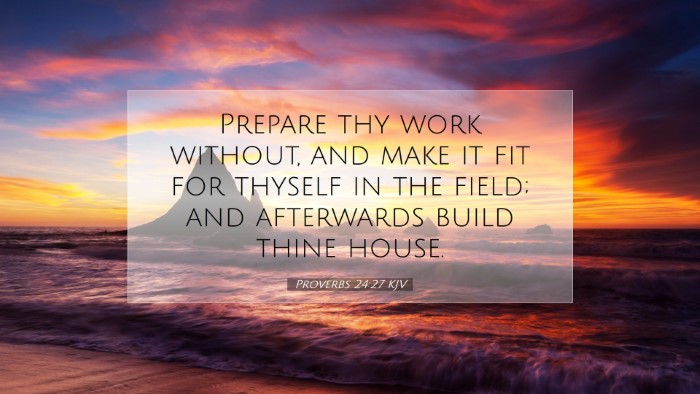Proverbs 24:27 - Commentary Summary
Proverbs 24:27 states, "Prepare thy work without, and make it fit for thyself in the field; and afterwards build thine house." This verse encapsulates the wisdom of preparation and prioritization in our pursuits, emphasizing the necessity of establishing a strong foundation before embarking on significant endeavors.
General Overview
This proverb encourages diligent planning and labor before undertaking large projects, symbolized by "building a house." The imagery employed highlights the value of working on the essentials first—such as one’s character, purpose, and the practical matters that prepare the ground for future successes. Commentators such as Matthew Henry and Albert Barnes expand on this by providing insights that blend practical wisdom with spiritual undertones.
Insights from Public Domain Commentaries
Matthew Henry's Commentary
Henry elaborates on the importance of preparing oneself and one’s resources. He notes the sequential nature of the proverb, pointing out that "the first step in any undertaking should be to ensure that everything is ready for it." According to Henry, this preparation is crucial not only for practical affairs but also for spiritual matters. He asserts that the act of working in the field signifies engaging with the world, while "building thine house" represents establishing a personal life grounded in faith and virtue.
Albert Barnes' Notes on the Bible
Barnes provides a detailed analysis of the meaning throughout the cultural and historical contexts of the verse. He emphasizes that the "field" can be understood as one’s livelihood, encompassing the responsibilities entrusted to individuals. Barnes suggests that "to prepare one’s work without means to cultivate an external capacity that will support the inner life, maturation, and spiritual existence". He highlights the need to focus on external affairs—such as one’s career, community interactions, and relationships—with diligence before indulging in personal ambitions.
Adam Clarke's Commentary
Clarke’s insights delve into the metaphorical implications of "building a house." He states that this relates not just to physical dwelling places but can symbolize broader pursuits in life, such as family, reputation, and spiritual legacy. Clarke adds that "the sinner's house is built on sand, while the wise prepare their personal and spiritual assets and build upon solid rock." His commentary stresses the spiritual applications of the verse, advocating for an initial focus on righteousness, wisdom, and understanding before one engages in building life’s more intricate aspects.
Practical Applications
- Diligent Planning: Every minister, theologian, and believer must focus on diligent planning. This not only applies to ministry but also personal life. The preparation of one's heart and work lays the groundwork for effective service to God and community.
- Spiritual Readiness: All good work stems from a heart that is right with God. Building one’s spiritual house through prayer, study, and meditation prepares the foundation for external endeavors.
- Sequential Action: The biblical principle of prioritizing tasks is a reminder that one cannot effectively build a meaningful life or ministry without first preparing adequately. This principle applies to academic pursuits, pastoral responsibilities, and community service.
Theological Reflections
This verse serves not only as a practical guideline but also as a theological reflection on God's order in creation and in human affairs. Just as God prepared the world before man, similarly, believers are called to prepare their work diligently. Engaging with this scripture leads to deeper insights about God's providence in preparation for His works.
Conclusion
Proverbs 24:27 encapsulates divine wisdom in prioritization and preparation. It stands as an edifying reminder for pastors, students, and scholars alike, guiding them to focus on foundational work that honors God before venturing into further advancements. By integrating these insights from esteemed commentaries, one is encouraged to reflect on their preparations in both spiritual and practical contexts, ensuring they build a life that is reflective of God's glory.


